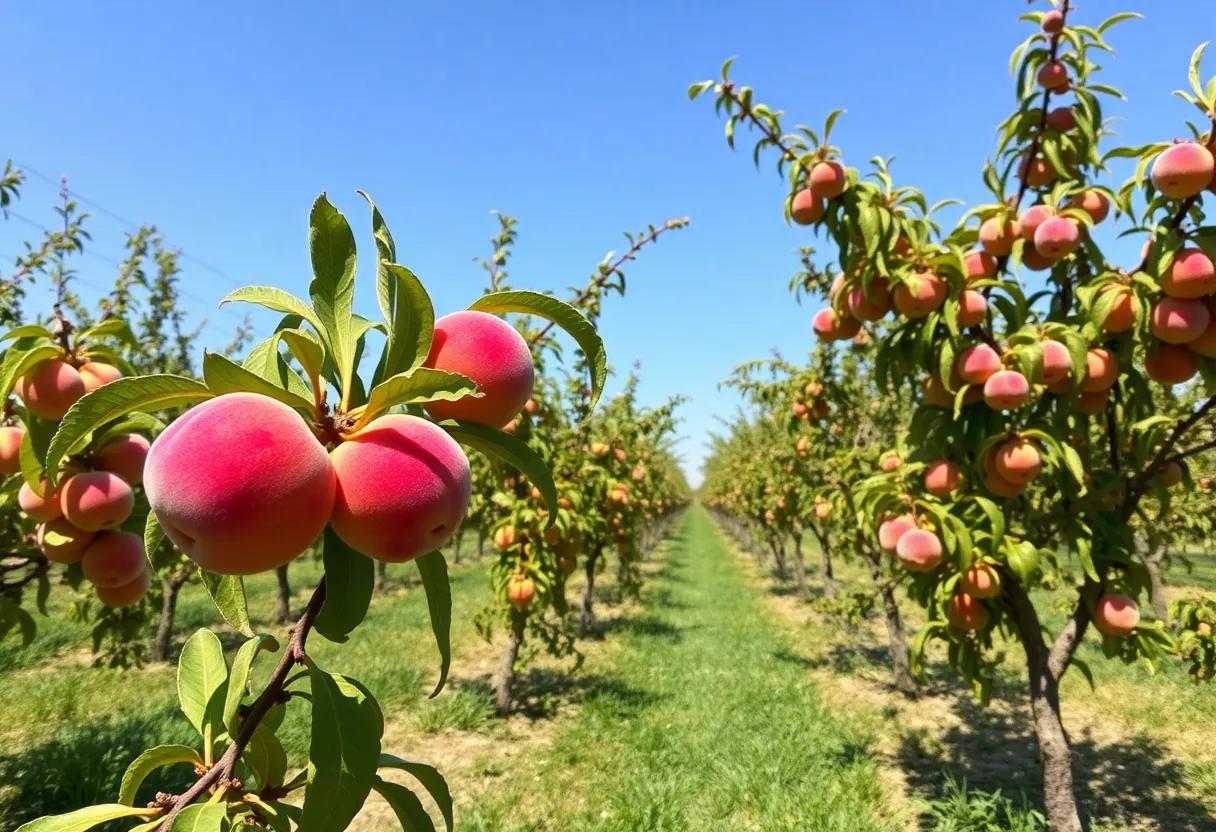News Summary
California’s peach production has dropped by 30% this year, primarily due to warmer winters disrupting the sleep cycles of peach trees. Growers suffer significant economic impacts as early blooming and crop failures occur. Farmers like those at Masumoto Family Farm struggle, facing rising prices and challenges from climate change. Similar issues plague peach growers in South Carolina and Georgia, making the future of peach farming uncertain despite efforts to adapt and innovate.
California is witnessing a significant decline in its peach harvests this year, with a reported decrease of 30% primarily attributed to warmer winters that have disrupted the natural sleep cycles of peach trees. This disruption has raised concerns for growers who rely on a limited twelve-week harvest for their livelihood, revealing the economic ramifications of climate change on agriculture. The Masumoto Family Farm, located in California’s Central Valley and renowned for its sweet peaches, has been notably affected by these changes.
The warmer winter temperatures have affected the crucial nutrient regulation processes in peach trees. Farmers like Mas Masumoto emphasize the importance of having their trees maintain a specified number of hours below 45 degrees Fahrenheit, a necessary factor for proper dormancy. The previous winter was marked by irregular cold weather patterns, with several unexpected warmer days that have negatively impacted various stone fruits, including peaches, plums, apricots, and cherries. Some growers reported complete crop failures due to these weather conditions.
According to agricultural experts, fluctuations in temperature have hindered the trees’ ability to maintain carbohydrates in their roots, a vital component for their health and productivity. Consequently, consumers are now facing increased prices for peaches, with yellow peaches rising by 23 cents per pound and white peaches by 17 cents. In the face of these challenges, the Masumoto family has managed to sustain a level of production, processing up to 10,000 pieces of fruit daily using their older groves and traditional irrigation methods. Their practice of furrow irrigation, which maintains soil health, contrasts with modern techniques that focus on individual plants.
Farmers express significant concern over the future of their crops and livelihoods amidst ongoing climate issues. In South Carolina, peach growers are grappling with similar difficulties, facing devastating losses after a late frost destroyed approximately 70% of their harvest. The situation is equally dire in Georgia, where Dr. Gregory Rieghard noted that the state suffered even higher crop losses, retaining only about 5% of its peaches. The peach farming sector is notably labor-intensive and highly sensitive to weather changes, making it a particularly risky venture compared to other types of crops.
In response to these adversities, farmers are adopting various strategies to mitigate losses. These include acquiring crop insurance and investing in protective measures like wind machines and burning straw to shield their crops. The warmer winters and fewer chill hours have resulted in early blooming of peaches, subsequently affecting the harvest timing. Nevertheless, agricultural experts maintain a cautious optimism regarding the future of peach production, highlighting advancements in developing peach varieties that require lesser chill hours.
Historically, Georgia held a prominent position in peach production before South Carolina surpassed it in volume. However, additional challenges loom, such as a reemerging disease known as phony peach disease (PPD), which threatens the quality and yield of peaches. The importance of peach farming is underscored by its substantial economic contribution, with South Carolina’s peach orchards spanning 15,500 acres and generating over $98 million for the local economy. This illustrates the fruit’s vital role in shaping regional identity and economic stability.
As the industry grapples with the pressing challenges presented by climate change, increased awareness surrounding the obstacles faced by peach farmers may foster greater understanding and support for the agricultural community. The future of peach farming remains uncertain, but collective efforts among farmers and experts might pave the way for improved resilience against climatic threats.
Deeper Dive: News & Info About This Topic
- CBS News: California Peach Harvests
- Wikipedia: Climate Change and Agriculture
- The Guardian: Peach Harvest in Southern U.S.
- New York Times: Peaches and Climate Change
- Macon Telegraph: Peach Production Challenges

Author: STAFF HERE BEVERLY HILLS WRITER
The Beverly Hills Staff Writer represents the experienced team at HEREBeverlyHills.com, your go-to source for actionable local news and information in Beverly Hills, Los Angeles County, and beyond. Specializing in "news you can use," we cover essential topics like product reviews for personal and business needs, local business directories, politics, real estate trends, neighborhood insights, and state news affecting the area—with deep expertise drawn from years of dedicated reporting and strong community input, including local press releases and business updates. We deliver top reporting on high-value events such as the Rodeo Drive Concours d'Elegance, the Beverly Hills artSHOW, Concerts on Canon, and holiday celebrations throughout the city. Our coverage extends to key organizations like the Beverly Hills Chamber of Commerce and Visit Beverly Hills, plus leading businesses in luxury fashion, hospitality, and entertainment that drive the local economy. As part of the broader HERE network, including HERELosAngeles.com, HERESantaAna.com, HEREHuntingtonBeach.com, and HERECostaMesa.com, we provide comprehensive, credible insights into Southern California's dynamic landscape.




